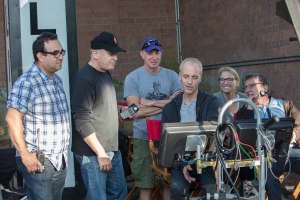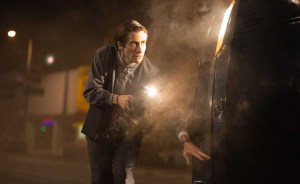
Even at first glance, Lou Bloom, played by Jake Gyllenhaal, is one of recent cinema’s more memorable nefarious characters. As written by Dan Gilroy, who directed Gyllenhaal in Nightcrawler, Bloom is at once dangerous, defiant and inscrutable.
“He’s a character with minimal backstory,” Gilroy said of Bloom, noting that there was an implied abandonment and abuse in the character’s past. “I believed that he had been raised in front of a computer. He was gifted mentally but had no moral guidance how to use it. When the film starts, he comes out of proto-darkness, fully formed. I feel that he’s an extraordinarily misguided young man who’s in a world of transactions.”
Gilroy, a longtime screenwriter but first-time director, implemented much of his own worldview in concocting the environment of this project. “The film and the character became a vehicle for me to get out a lot of personal ideas and themes,” Gilroy said. “I feel that we live in a world of hyper-capitalism, the jungle. The strong survive by killing the weak. Jake said coyotes are roaming around and hungry – lean looking. It was Jake’s idea to lose this weight [27 pounds in eight weeks]. He never had enough to eat during the shoot. I thought he would lean over and eat the other characters. He’s dangerous and maladjusted, but there’s a purity to him like an animal. Violence happens in getting things done. Lou understands people the way a lion understands a gazelle.”

The genesis of Nightcrawler came about years ago, when Gilroy learned of Weegee, the crime photographer from the 1930s. “I heard about stringers, who are the modern equivalent, with a dozen police scanners,” he said. “Suddenly, this character of Lou came up. I wrote it quickly. These are things I feel personally. I’m leery of writing films with overt messages. If you set out to write a message film, it’s problematic. It was exciting, the six weeks I spent writing it. Normally, it takes three months. I had an outline for Nightcrawler. The plot became a safety net. I wanted to follow the characters — I veered away from the outline.”
As Bloom happens upon a video news crew filming a freeway accident and rescue, one feels instinctively as though he will take an interest in doing similar work, though the lengths he will travel to reach his goals remains unclear. “There’s a naïve innocence for the character,” Gilroy related. “If I presented it as a success story, and he was an evil character who meets justice, he literally then became a mirror to the world as I see it. I think the maladjusted are the ones who are the most successful right now. They’ve climbed to positions of power and claimed a disparity that’s never existed before now. Lou could be running a major multinational corporation.”
 After Gyllenhaal read the script, he and Gilroy worked together to get the movie off the ground. “Jake and I have great love for this character,” said Gilroy. “Once we saw him as an animal, he transcended reality and became innocent. As I started to write an anti-hero — and had never written one — one misstep and the audience would misinterpret it. It would just become a character study of a psychopath, someone who is human but animalistic. The problem isn’t Lou, it’s the world that creates and rewards a Lou.”
After Gyllenhaal read the script, he and Gilroy worked together to get the movie off the ground. “Jake and I have great love for this character,” said Gilroy. “Once we saw him as an animal, he transcended reality and became innocent. As I started to write an anti-hero — and had never written one — one misstep and the audience would misinterpret it. It would just become a character study of a psychopath, someone who is human but animalistic. The problem isn’t Lou, it’s the world that creates and rewards a Lou.”
In his ascent as a video news gatherer, or stringer, Bloom meets his foremost competition, Joe Loder (Bill Paxton), the ruthless, seasoned, news veteran. “I saw Bill’s character as the Terminator and Lou as T2,” Gilroy detailed. “There’s an evolutionary species. Bill’s character can’t conceive of a T2 coming over the horizon in the form of Lou Bloom. This is the new animal that’s been bred in this landscape and is far more dangerous. They [veteran news people in Nightcrawler] think he’s like them. They don’t understand that Lou’s not like them.”
 After writing Nightcrawler Gilroy was unsure whether his script would be more appropriately placed into another director’s care. “I came upon this world and didn’t know if I would direct it or not,” he said. “When Lou jumped off the page and all of these ideas and themes became a vehicle, I knew I wanted to direct it. This is too personal. I feel these ideas strongly, the equation that I knew I wanted to do to get these ideas across.”
After writing Nightcrawler Gilroy was unsure whether his script would be more appropriately placed into another director’s care. “I came upon this world and didn’t know if I would direct it or not,” he said. “When Lou jumped off the page and all of these ideas and themes became a vehicle, I knew I wanted to direct it. This is too personal. I feel these ideas strongly, the equation that I knew I wanted to do to get these ideas across.”
Positioning himself into the director’s chair was trying, even for a screenwriter with notable industry credits. “You have to commit yourself to want to be a first-time director,” he said. “You have to feel passionate about it if it’s something you are generating. There were big directors who wanted to direct this, but I felt I was ready to direct. I was not going to let go of this. That translates when you are trying to get other people involved. I was totally committed and that gave Jake confidence to get on board with it. Commitment and passion are key. Directing just organically came from, ‘I am the only one to translate this.’”
 Given the nature of the character, Gilroy had strong opinions about the material in pre-production, but he considered himself to be a collaborative director with his cast and crew. “I welcomed the chance to work with Jake for three months and rehearsed so many different variations of scenes and different aspects of the character,” Gilroy described. “By the time we got on set, we were way ahead of the game. That was my style. Jake was so deeply committed to this part. He approached it like a play. He was a producer, ultimately involved in all aspects of it.”
Given the nature of the character, Gilroy had strong opinions about the material in pre-production, but he considered himself to be a collaborative director with his cast and crew. “I welcomed the chance to work with Jake for three months and rehearsed so many different variations of scenes and different aspects of the character,” Gilroy described. “By the time we got on set, we were way ahead of the game. That was my style. Jake was so deeply committed to this part. He approached it like a play. He was a producer, ultimately involved in all aspects of it.”
Gilroy conveyed that working with a crew was a refreshing experience once he found his métier in working with close collaborators on stage and location. “Ultimately, I had never been in charge of 120 people before,” he said. “Robert Elswit [cinematographer], John Gilroy [editor], Jake, they are looking for a leader, somebody who has a vision that they are passionate about and entrusting their careers to someone who has never directed before. You learn something about yourself when you direct. Leadership has many different styles.”
 As Gilroy entered postproduction on Nightcrawler, he had some down time and amazingly conceived another script, Storming Vegas, to be directed by Antoine Fuqua, concerning an audacious string of daytime robberies. Gilroy has since also devised another screenplay idea for himself to direct. His plan is to “write it on spec, and if it comes out good, I will attract another wonderful actor and raise money. I love writing and don’t feel the need to direct all the time. Hopefully, that will happen regularly, but if I had a period where an idea wasn’t coming to me, I would definitely still write.”
As Gilroy entered postproduction on Nightcrawler, he had some down time and amazingly conceived another script, Storming Vegas, to be directed by Antoine Fuqua, concerning an audacious string of daytime robberies. Gilroy has since also devised another screenplay idea for himself to direct. His plan is to “write it on spec, and if it comes out good, I will attract another wonderful actor and raise money. I love writing and don’t feel the need to direct all the time. Hopefully, that will happen regularly, but if I had a period where an idea wasn’t coming to me, I would definitely still write.”
With Nightcrawler gathering momentum in the crowded awards season, Gilroy points to his character and film as a cautionary tale. “This is what success looks like when you leave your humanity behind,” he said. “You will be consigned to a life in which you sever all ties with humanity. It’s a very cold dark place. I hope that ten years from now, of the films from this time period, this is still a film that’s talked about.”





